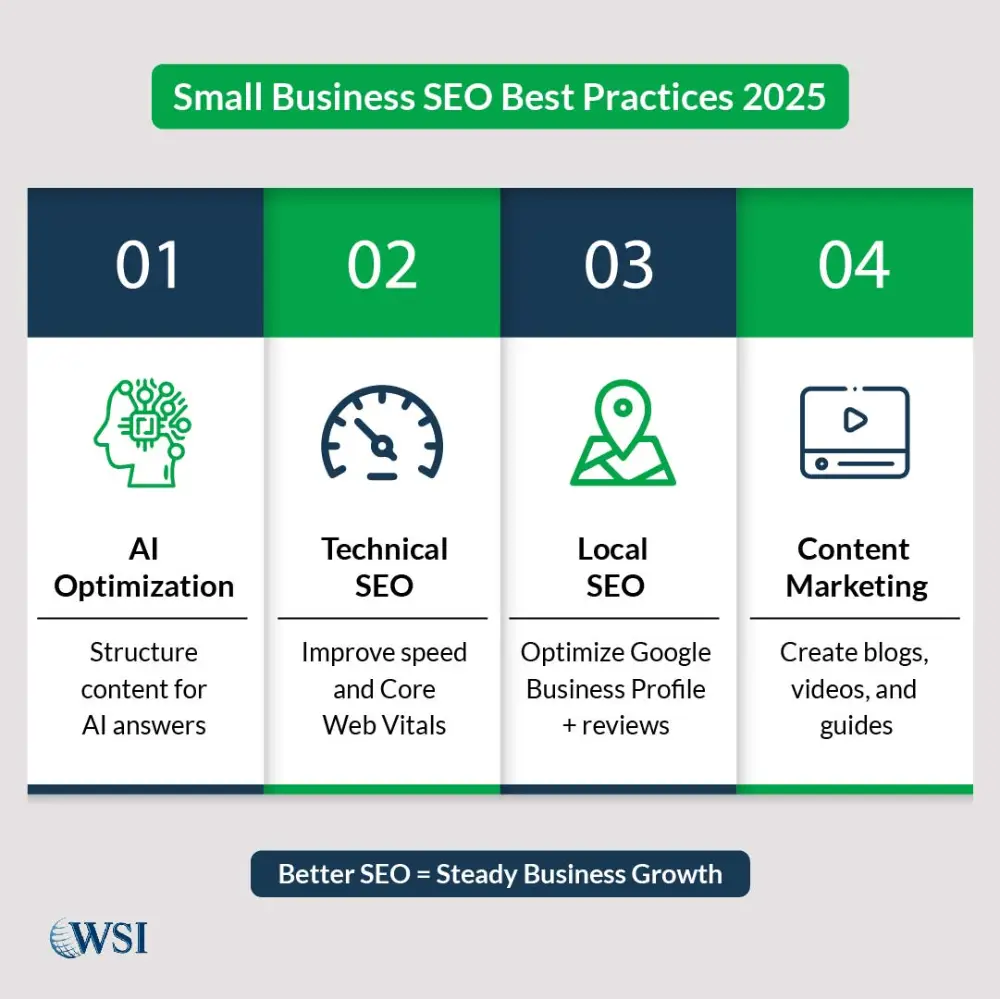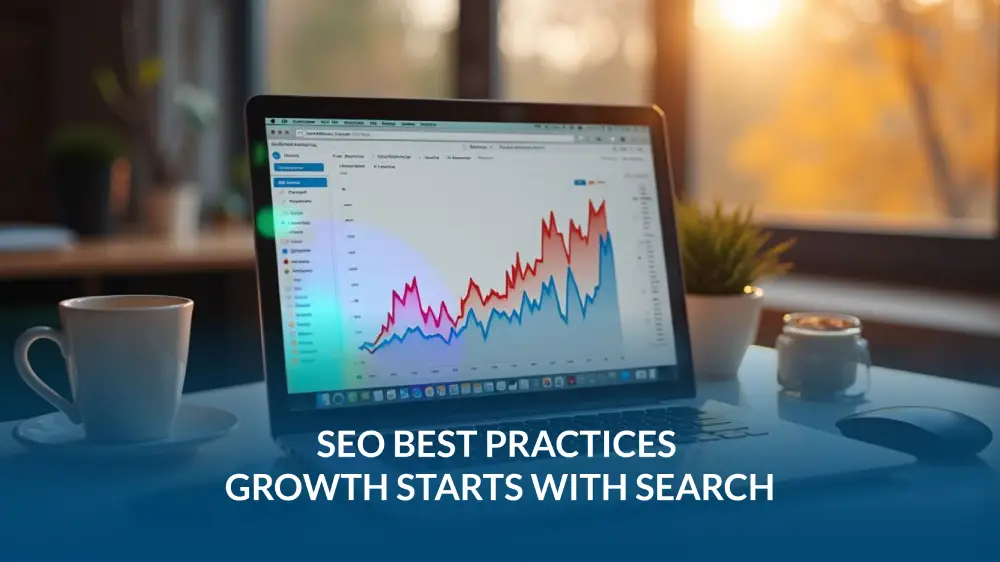Search has become more than just typing words into Google. Customers now rely on AI-powered answers, voice commands, and visual search to decide who they want to do business with. They expect fast-loading websites, accurate local results, and content that proves your business understands their needs. For small businesses, this means SEO is no longer optional; it’s the bridge between what customers are asking and how your company responds online. Without it, you risk being invisible at the exact moment people are ready to buy.
Key Takeaways:
- SEO in 2025 is about clarity, trust, and adapting to AI-driven results.
- Local SEO and technical performance remain crucial for small businesses.
- Content must focus on customer intent, not just keywords.
Contents
Why SEO Still Matters in 2025
Search engines remain the starting point for most online experiences. Studies show that 53% of all website traffic comes from organic search, and the top spot on Google captures over 27% of clicks. For small businesses, that means ranking well can directly translate into new leads and sales. Paid ads can help temporarily, but they disappear the moment you stop spending. SEO continues working in the background, building momentum and visibility over time.
Yet 42% of small businesses still don’t have a defined SEO strategy. That’s a missed opportunity. In competitive markets, the businesses that commit to SEO now are the ones dominating search results tomorrow.

SEO Is a Long-Term Strategy
SEO is not an overnight fix; it’s an ongoing process of building authority and trust. Think of it like networking in your community: the more consistent you are, the more people recognize and recommend you. Search engines work the same way. They reward businesses that regularly produce useful content, maintain a technically sound site, and keep visitors engaged.
In 2025, this long-term mindset matters more than ever. Search engines like Google and Bing now present AI-powered summaries and direct answers, which means only the most reliable, well-structured content is selected. Businesses that treat SEO as a one-time task are quickly pushed aside. The winners are those who build SEO into their regular operations, treating it as part of business growth, not just marketing.

Need SEO that keeps delivering results over time?
long-term visibility with content and strategy that grow stronger each month.
New SEO Practices for 2025
Search behavior has shifted dramatically. Customers don’t just type short keywords anymore, they speak full questions into smart devices, upload images, and rely on AI tools to compare results. If your SEO strategy hasn’t evolved to match, you’re already behind.
AI and Generative Engine Optimization (GEO)
Generative AI tools summarize information from multiple websites. To be included, your content must be clear, structured, and authoritative. Schema markup, FAQs, and expert authorship all increase your chances of being featured inside these AI-generated results.
Voice and Visual Search
Voice searches are more conversational, often framed as questions. Visual search lets customers find products using images instead of text. More than 50% of Gen Z use visual search weekly, meaning businesses that optimize product images and alt text are reaching audiences others ignore.

Is your SEO ready for AI, voice, and visual search?
Stay visible in the ways customers are actually searching in 2025.
Technical SEO Still Matters
Even the best content won’t perform if your site is slow, confusing, or poorly built. Technical SEO ensures search engines can read your site correctly and users can navigate it without frustration.
Google now prioritizes Core Web Vitals, Interaction to Next Paint (INP), Largest Contentful Paint (LCP), and Cumulative Layout Shift (CLS). Sites meeting these standards are 24% more likely to rank higher. Mobile performance is equally critical, with 63% of all traffic coming from phones.
If your site loads slowly or isn’t mobile-friendly, you’re not just losing rankings, you’re losing potential customers. Free tools like Google PageSpeed Insights and GTMetrix highlight where to improve.

Is your website helping or hurting your SEO?
Technical issues can push you down in rankings. Fix them before your competitors do.
Local SEO for Small Business Growth
When people search for services near them, they’re usually ready to buy. That’s why local SEO is often the most powerful strategy for small businesses. Showing up in Google’s Local Pack (map results) can put you directly in front of customers making fast decisions. Research shows the Local Pack attracts up to half of all clicks.
Local SEO isn’t complicated, but it requires consistency. Claim your Google Business Profile, update it regularly, encourage reviews, and make sure your business details match across directories. These steps increase trust, both with search engines and potential buyers, positioning your business as the go-to choice in your area.

Want to bring in more local leads?
Optimize your Google Business Profile and show up where people are searching nearby.
Avoiding Costly SEO Mistakes
SEO delivers real growth when done correctly, but it can also waste money when managed poorly. A cautionary example: an electrician in Australia spent $20,000 on SEO and saw only four monthly visits, with no new sales.
The mistake wasn’t investing in SEO, it was investing without accountability. Rankings are meaningless if they don’t generate leads. Small businesses should demand transparent reports that tie SEO work directly to phone calls, form fills, and revenue. Without that, you’re paying for activity, not results.

Tired of SEO agencies overpromising and underdelivering?
Protect your investment by demanding strategies tied to leads and revenue.
Building an SEO Strategy That Works
A winning SEO strategy combines technical expertise, quality content, and a clear understanding of your customers. It’s not about chasing ten keywords, it’s about building a system that drives business growth.
Here’s what works in 2025:
- Set SMART goals tied to outcomes like leads or sales.
- Map the customer journey with content for awareness, consideration, and purchase stages.
- Publish across formats, blogs, videos, podcasts, and infographics.
- Strengthen trust with expert authors, citations, and structured data.
- Review progress monthly and adapt as AI-driven results evolve.
Small businesses that follow these steps consistently outperform those relying on outdated tactics or guesswork.

Need a clear plan for SEO success?
Align your goals with a proven roadmap that drives real business growth.
Turn SEO Into Real Business Growth in 2025
SEO isn’t about chasing rankings, it’s about being visible wherever customers are searching. In 2025, that means showing up in AI-driven results, mobile searches, local maps, and voice queries. Small businesses that invest in SEO today will own the digital space tomorrow. The next step is clear: stop waiting for customers to find you and start building a strategy that makes your business the obvious choice online.


